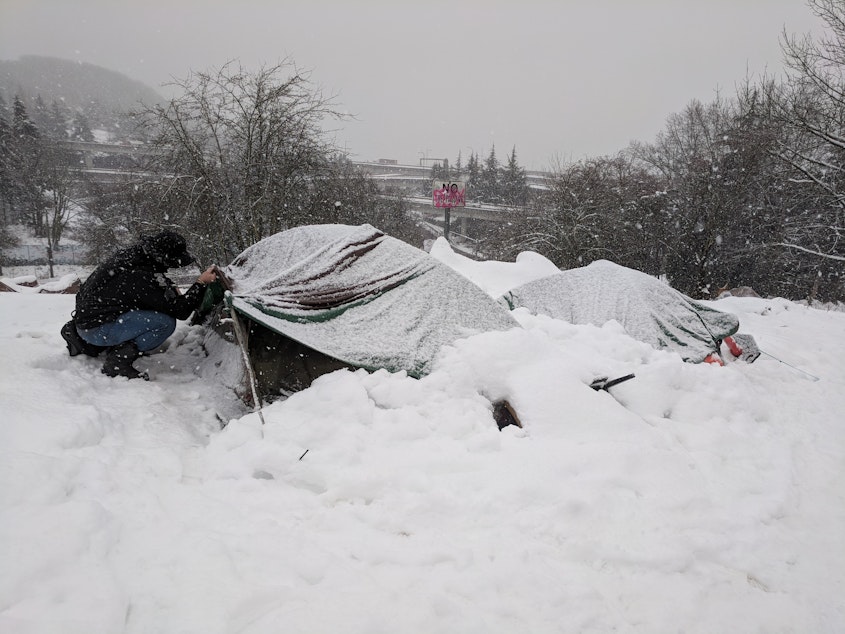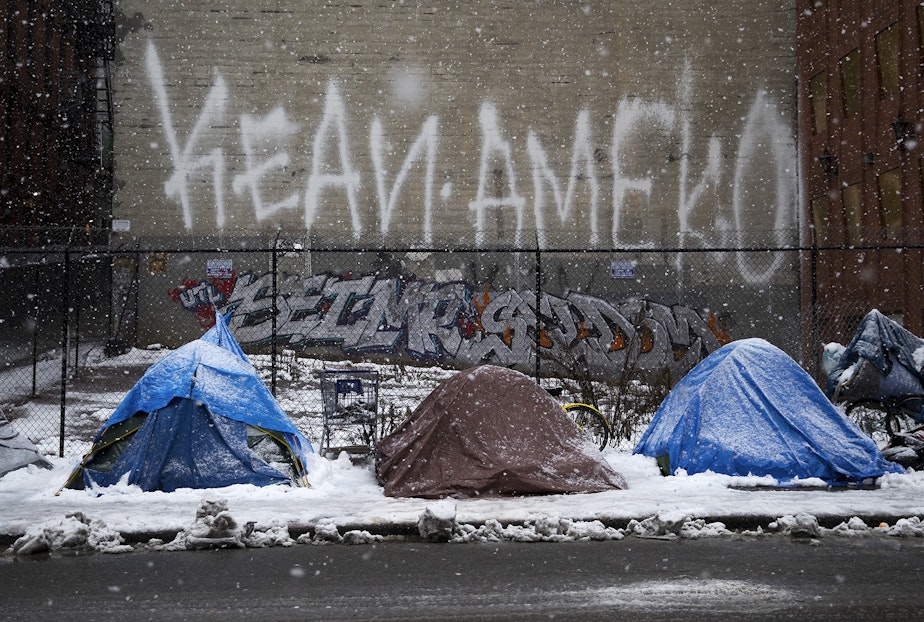Seattle officials try to bring people inside from the cold, with mixed results

Big, white snowflakes fell fast as we approach a cluster of 10 or so tents near the Central District, some of them half-buried in the snow on the ground.
“This is an area that's encamped a lot,” the Seattle Police Department’s Sgt. Eric Zerr, a member of the city’s Navigation Team, explained on Monday afternoon. “We're going to be contacting people here to see if we can get them into the severe weather shelters.”
On a regular day, Zerr and the rest of the Navigation Team are tasked with doing outreach and removing unauthorized camps.
But right now it's all about getting people out of the weather, even temporarily.
February has been the snowiest month in Seattle in 50 years. Winter storms have battered the region and brought freezing temperatures. At least three people have died from hypothermia in King County already, according to the King County Medical Examiner’s office. One man who died in Seattle was likely homeless.

Sponsored
With that in mind, the Navigation Team has stepped up its efforts over the last week. The team helped 24 people travel to shelter Monday night and transported 67 people to shelters on Sunday.
Zerr rattled the sides of tents and conducted conversations through the fabric.
A few people walked around bundled up in coats and blankets, but many kept their tents firmly closed against the chill.
A man who went by O.G. said he'd go inside for the night if Zerr could come back later. Zerr said he would.
Sponsored
The police sergeant had less luck with a woman named Missy.
“I don't like to go too far from my friends so I probably won't go in,” Missy said. “I'll stay out here in this weather.”
Missy said she had prepared for the cold with gas stoves, layers of clothing and blankets.
But Zerr had a sales pitch: “You got your own cot, they’ve got three meals a day...”
When Zerr gets a no, it can be for a range of reasons.
Sponsored
“I listen and I'll ask questions as to why that might be,” Zerr said. “If I just ask and delve into it, it's something we may totally be able to resolve.”
Outreach teams are distributing hats, gloves, socks and food to people who don’t want to go to shelters.
Eventually, Zerr got a yes on Monday afternoon. Trinity, known on the streets as Miracle, had been sleeping outside.
After talking to Zerr, she said she was looking forward to going to the Garfield Community Center.
Trinity had been staying at a friend’s and heating the space by lighting hand sanitizer on fire, she said.
Sponsored
“It keeps it warm without any smoke,” Trinity said. “And before that I was staying in doorways and bus stops and stuff and my feet were frozen.”
In response to the winter storms, the city has opened hundreds of additional shelter beds, including a 24-hour severe weather shelter at the Garfield Community Center. It served 116 people Monday night, and offers meals and showers.
Temporary emergency shelters will remain open through the weekend, and now the City’s Human Services Department is working with service providers to develop exit plans for people staying in these spaces.
“It's been a godsend, it's really been a godsend,” Ashes-Leigh, one of the women staying at the Garfield shelter, said. “I mean, we would have died out there in the cold. We didn't have the money for propane, we didn't have the money to keep warm.”
Ashes-Leigh, who usually stays in a tent, said it's hard for her to get housing because she's got a felony record.
Sponsored
Trinity didn't bring her tent or other belongings with her when she came to the shelter; she left it with a friend to watch.
She’s not sure whether she’ll come back to a tent that’s collapsed and buried her possessions under snow. Still, Trinity said she's glad to be inside for now.
According to a statement from the city, exit plans from these shelters include assessing people for housing placements, matching them with other needed services and potentially organizing short-term motel stays to provide more time to get people into housing.
Emergency shelters in Seattle:
- Seattle Center Exhibition Hall severe weather shelter, 301 Mercer St. Open 7pm to 7am through Monday, February 18.
- Seattle Center Armory, 305 Harrison St. Open as a warming shelter from 7am. Closes at 9pm Sunday through Thursday, 10pm Friday and Saturday. Open as a warming shelter through Monday, February 18.
- Mary’s Place family extreme weather shelter. Open 24 hours. Call the King County Coordinated Family Intake Line at 206-245-1026 for access or drop in at 312 Dexter Ave N.
- Garfield Community Center shelter, 2323 E Cherry St. Open 24 hours through the morning of Monday, February 18.
- Bitter Lake Community Center shelter, 13035 Linden Ave N. Open 24 hours through the morning of Monday, February 18.
- King County Administration Building shelter, 500 4th Ave. Open 24 hours through at least Thursday, February 14.
- King County day center and shelter, 4th Ave and Jefferson St. Open 24 hours.
- Ernestine Anderson Place shelter, 2010 Jackson St. Open 14 hours through Monday, February 18.
For information about shelter resources, people can call 2-1-1




